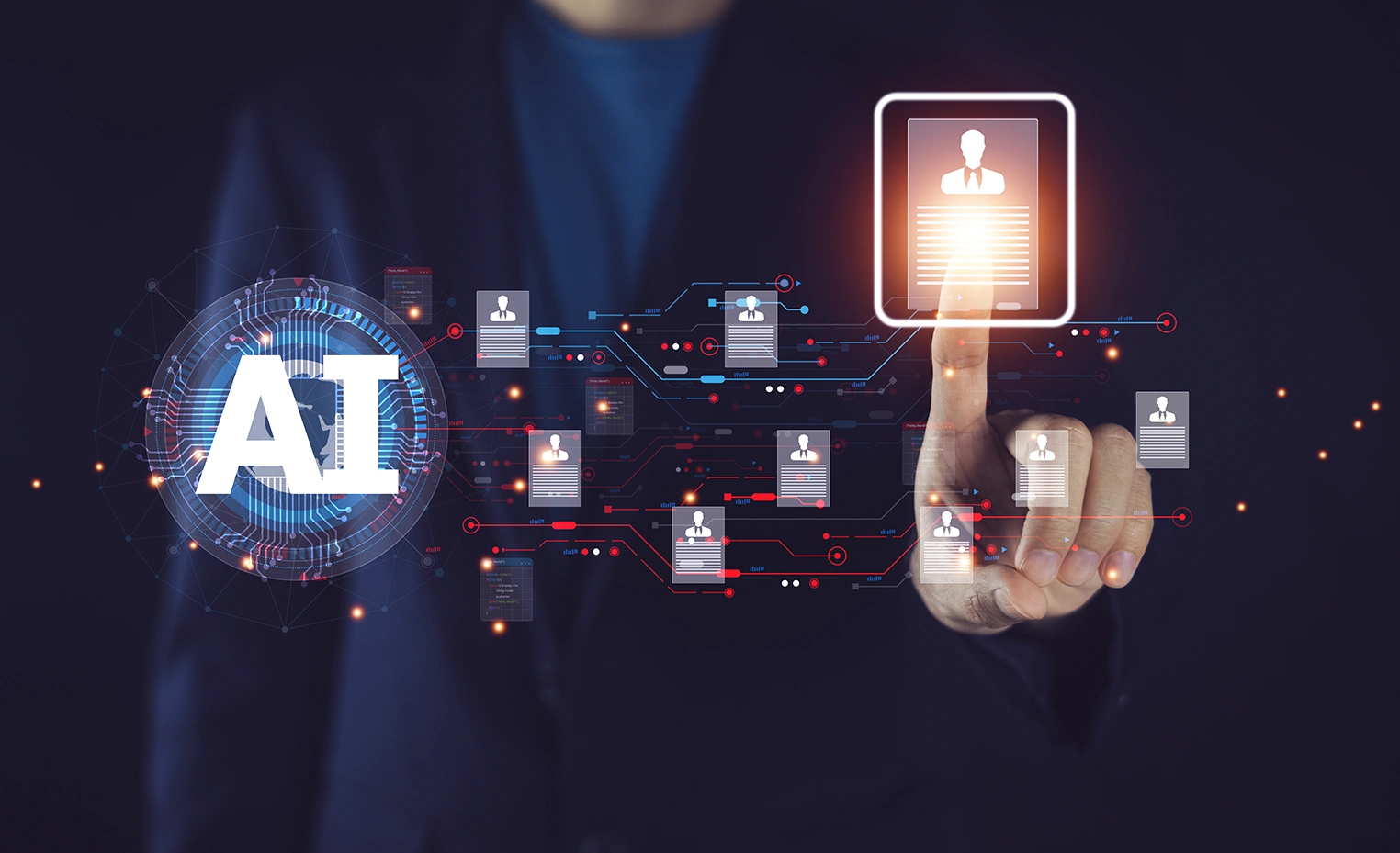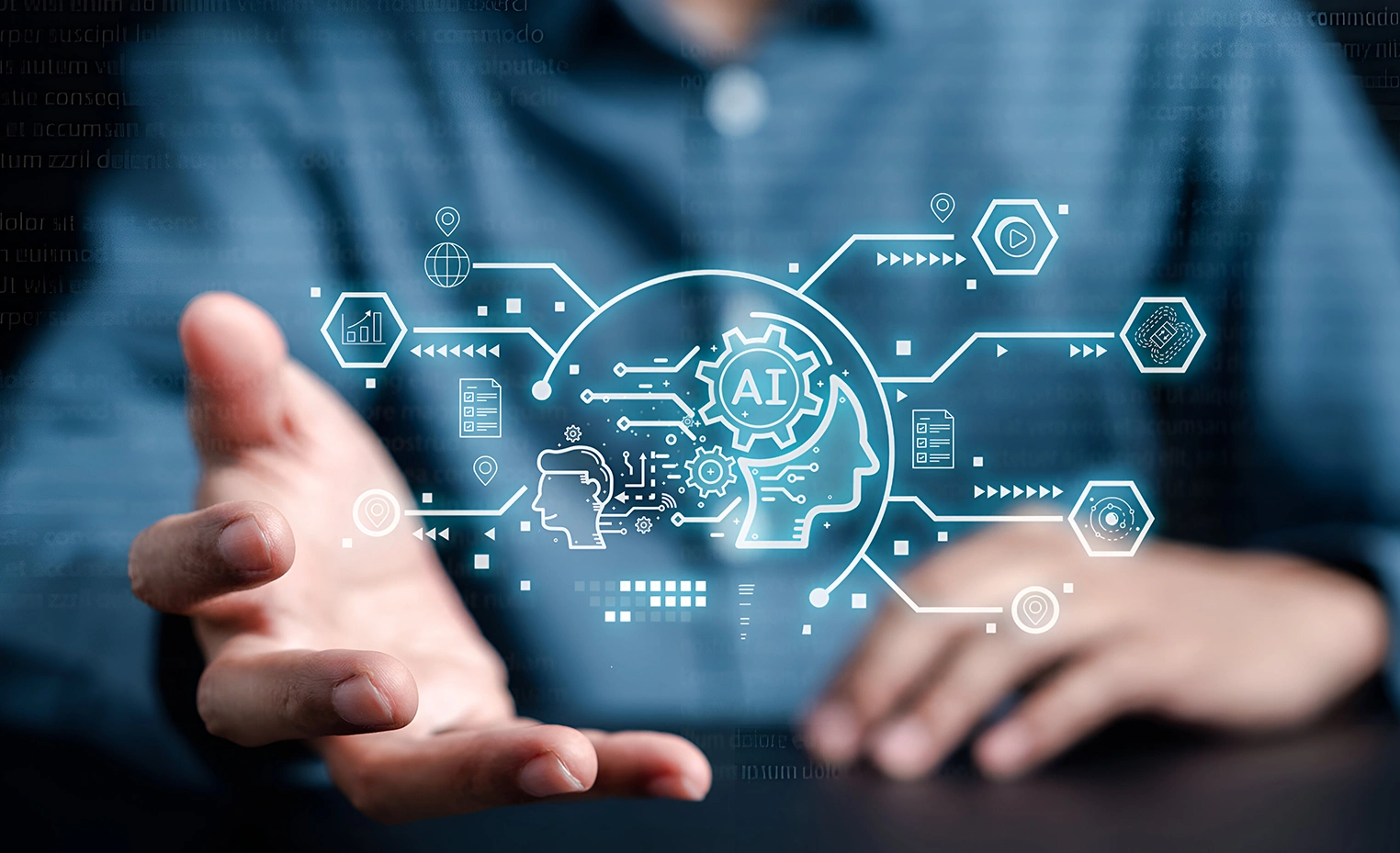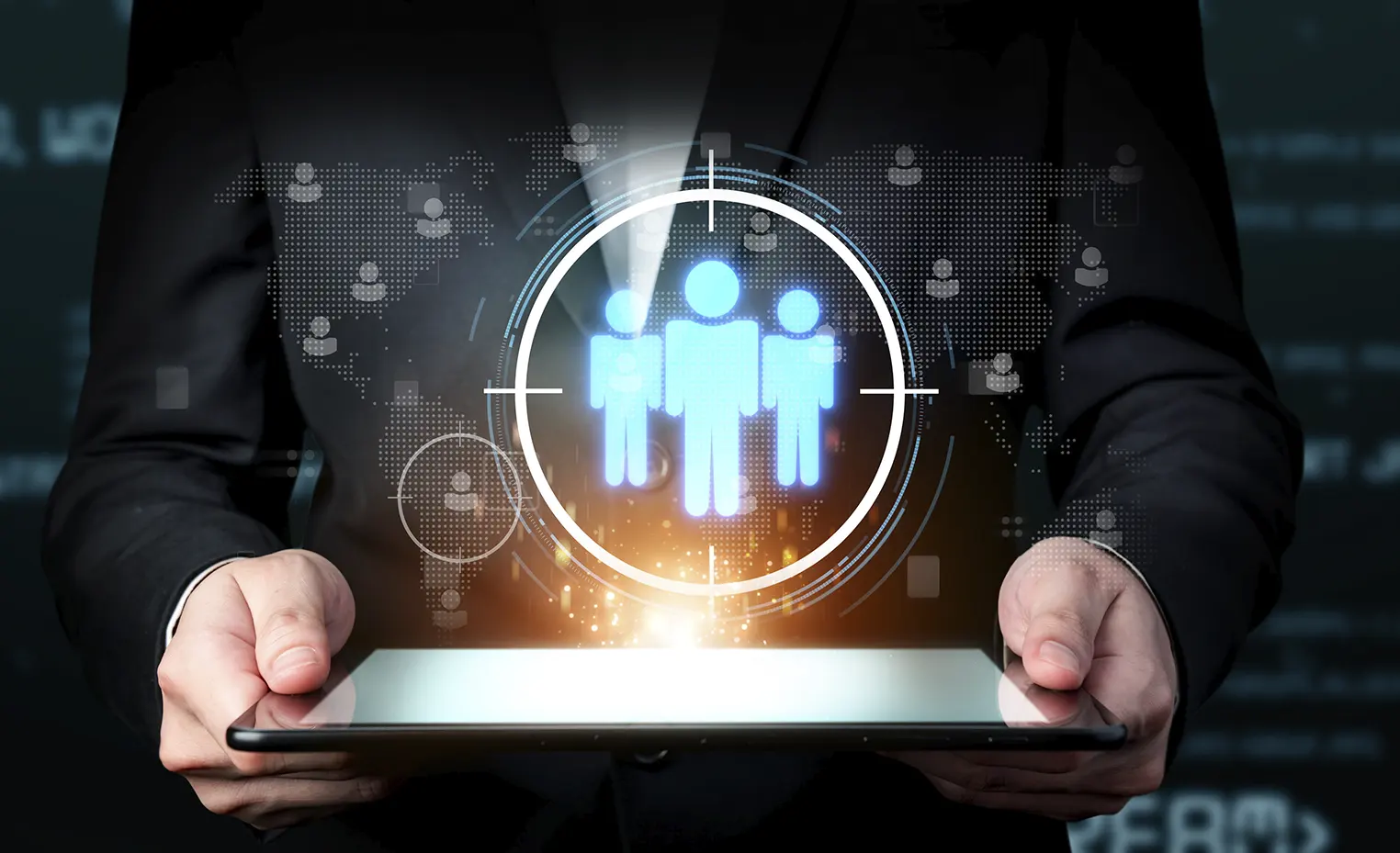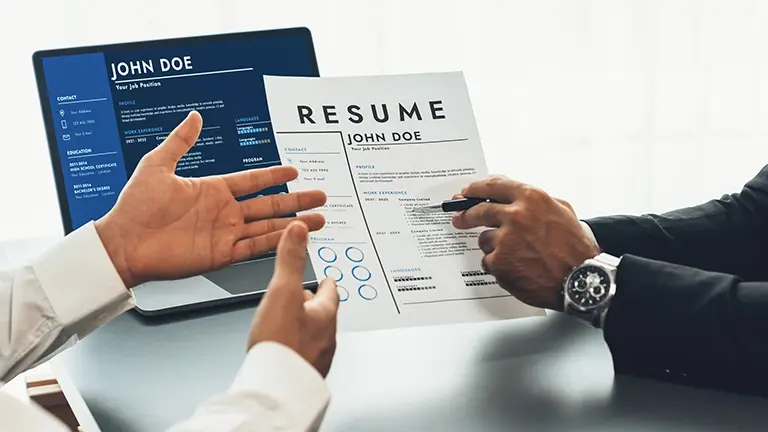Today, recruiting and hiring technology looks very different than it did a few years ago, and the reason – AI. According to LinkedIn’s 2025 Future of Recruiting Report, 50.9% of talent acquisition professionals feel AI may help them enhance hiring quality, and businesses that employ AI recruiting are 8.9% more likely to make a quality hire than those that don’t.
It is also noted that the global artificial intelligence in HR market is expected to increase from $6.05 billion in 2024 to $6.99 billion in 2025, with a compound annual growth rate (CAGR) of 15.6%. This spike is being driven by the adoption of AI-powered technologies that streamline recruitment, increase employee engagement, and improve performance management.
The real difference lies in how AI has evolved—from experimental tools to strategic solutions. Currently, organizations are no longer simply testing AI tools. They are forming entire recruitment and talent acquisition strategies around them.
The winners are those that recognize that AI for hiring is not a magic wand, but rather a sophisticated instrument that requires careful deployment.
In this blog, we’ll delve deep into the future of hiring involving AI recruitment software.
Table of Contents
ToggleWhat is AI for Recruiting?
AI recruiting uses artificial intelligence to automate time-consuming tasks and deliver smarter, personalized hiring decisions. AI is the science of teaching machines to replicate human intellect and creating systems capable of performing activities that normally require human intelligence.
For example, numerous fields are using AI to handle enormous volumes of data in order to boost efficiency, reduce manual errors, and increase production. AI combines automation with intelligence — learning, reasoning, and adapting — to handle complicated, repeatable issues with quality results.
Similar automation capabilities can be used in recruiting, particularly for repetitive, high-volume employment operations including talent sourcing, candidate screening, interview scheduling, and onboarding. AI-powered technology is intended to speed up time-consuming manual operations, allowing recruiters to focus on more valuable human efforts.
Additionally, recruiting AI enables talent acquisition teams to identify passive applicants and gain data-driven insights that influence decision-making and lead to better outcomes, such as hiring quality. It enables AI applicant tracking tools to help match suitable candidates to relevant job openings within recruiting platforms.
Importance of AI Recruiting
By automating time-consuming tasks, AI recruitment software boosts efficiency and allows teams to focus on high impact hiring goals. As AI in recruitment becomes more mainstream and the market gets highly competitive, talent acquisition executives should consider incorporating AI-powered recruiting software to flourish in a world where faster and smarter hiring is essential.
So, why is AI recruiting essential? Let’s find out!
AI acts as a strategic partner for effective hiring
AI’s true potential is in its ability to transform recruitment from a reactive to a proactive strategy. With predictive abilities, AI may find and surface high-potential candidates before they even apply, allowing talent acquisition specialists to engage talent early and more meaningfully. Instead of waiting for the right resume to land in their email, recruiters can now use data-driven insights to find and engage with the best-fit prospects, thereby reducing recruitment costs and improving time-to-hire.
AI and automation helps in smarter recruitment
Recruiters usually have a lot on their plate—sourcing, screening, interviewing, onboarding, and others. AI recruitment makes it possible. AI takes care of the repetitive stuff, so recruiters can focus on what really counts—making smart, strategic hiring moves. For instance, AI chatbots and scheduling integrations can help coordinate interviews more efficiently without any missed deadlines or miscommunication.
AI and Personalization to Deliver Tailored Talent Experiences
AI recruitment software makes hiring feel more personal—for everyone. Candidates see job suggestions that actually match their skills and goals. At the same time, recruiters get customized talent pipelines built around past hiring success and cultural fit.
AI and data insights for better decisions
For years, talent leaders have struggled with poor data. AI recruitment changes that—offering smarter insights to surface hidden gems, rediscover past candidates, and connect with top talent faster. With this intelligence, recruiters can devote more time to high-value interactions, decreasing hiring time and expense while enhancing hiring quality.
Where AI Is Actually Making Recruiting Better?
Accurate implementation of AI recruiting tool in recruiting leads to real, quantifiable results. Here’s where it truly transforms recruitment processes in 2025.
Faster sourcing, efficient workflows and minimal wasted hours
The teams using AI recruiting witness a streamlined hiring process.
- AI-driven sourcing: AI-powered sourcing identifies candidates based on skills instead of solely focusing on keywords.
- AI candidate screening: As per an article by Forbes, AI recruitment software can reduce time to screen for each applicant by 40 minutes.
- Workflow optimization: AI systems can optimize workflows by identifying which prospects are likely to progress through each stage, allowing recruiters to prioritize their efforts.
Predictive Analytics: Talent Fit Scoring, Turnover Risk, and Role Alignment
Today, the most advanced AI applicant tracking system provides predictive hiring analytics that were pure fiction just a few years ago:
- Talent-role fit prediction: It analyzes thousands of successful placements to forecast which individuals are most suited for specific roles or company cultures.
- Retention prediction: Some recruitment platforms can identify retention risk factors throughout the recruitment process, identifying people who may leave based on prior patterns.
- Performance forecasting: A Forbes article revealed that AI and machine learning enable firms to handle massive volumes of data and grasp candidates’ implicit skills in addition to their official qualifications, resulting in a more complete picture of each application.
Automation for the right tasks: administration, scheduling, and funnel metrics
The true strength of AI recruiting lies in automating low-effort, high-volume processes—freeing up teams to focus on strategic work:
- Interview scheduling: Improving interview coordination by eliminating scheduling conflicts that can be frustrating for both candidates and recruiters.
- Talent communication: AI-driven communication keeps the talent pipeline engaged with timely, personalized status updates.
- People analytics: Real-time analytics on pipeline health, diversity metrics, and bottlenecks.
A Forbes article revealed that AI recruitment tools can help improve the interview process by making interview criteria more consistent, fair, and candidate-friendly. AI-driven interview scoring ensures that candidates are evaluated using defined criteria.
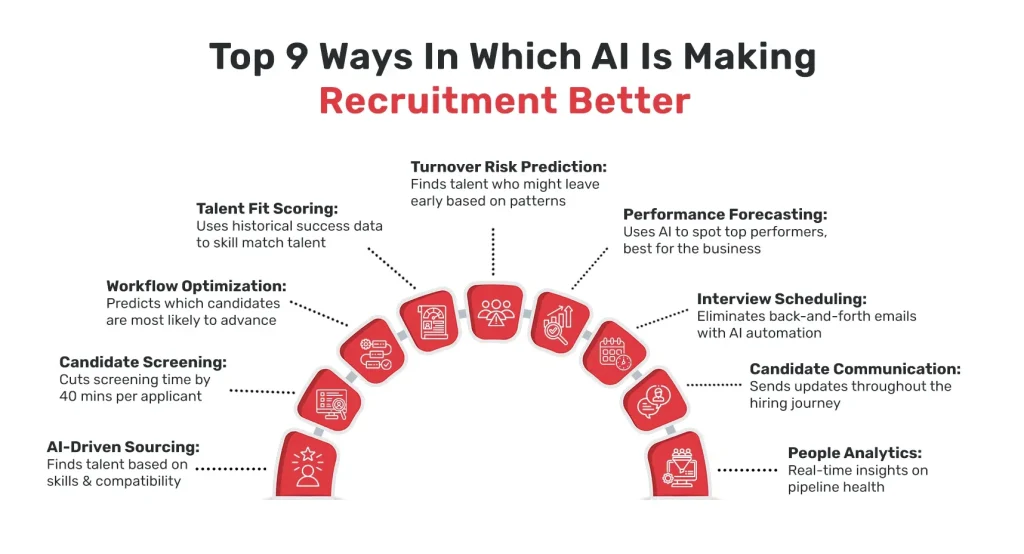
The Rise of Generative AI (GenAI) and AI Agents in Recruitment
GenAI takes hiring tech to the next level—where traditional AI analyzes data, GenAI actually creates personalized content and interactions. GenAI helps recruitment teams to create unique candidate experience, from sending personalized outreach messages to developing job descriptions and interview questions. It’s no longer enough to simply identify the right talent; recruiters must also engage them with the correct message at the right moment.
Whereas standard AI systems automate repetitive activities, AI in recruiting serves as a creative collaborator, increasing candidate engagement, lowering recruiter strain, and enabling faster, more meaningful relationships throughout the hiring process.
How to Use GenAI in Recruitment?
GenAI is redefining recruitment by streamlining processes, increasing candidate engagement, and ensuring better hiring decisions. Here’s how recruiters can use it effectively:
- Automated job descriptions and personalized outreach– GenAI can create engaging job descriptions for individual roles, assuring clarity. It helps you reach out to candidates with messages that actually resonate—built around their strengths, background, and interests—so they’re more likely to respond.
- AI-powered resume screening and matching– Manually reviewing resumes can be time-consuming. AI recruitment software can analyze, and rank individuals based on job requirements, allowing for the fast identification of the greatest fit. By highlighting skills and qualifications, it helps minimize bias tied to personal background.
- Chatbots for talent engagement– Think of AI chatbots as your always-on recruiting assistant—chatting with candidates, answering questions, booking interviews, and even pre-screening them. This provides a consistent experience for candidates while allowing recruiters to focus on more critical duties.
- Predictive analytics to improve hiring decisions– GenAI can forecast which candidates will succeed in a post by evaluating previous recruiting data. It can analyze cultural fit, performance potential, and even recommend areas for upskilling, allowing recruiters to make more educated judgments.
- Decreased time to hire– By automating routine steps such as candidate screening and interview coordination, AI accelerates the entire recruitment process. By accelerating processes, it not only streamlines hiring for teams but also delivers a smoother, faster experience for candidates.
Core technologies used in AI recruitment tools
As stated earlier, AI recruitment software improves the efficiency and efficacy of the recruitment process. Some key functionalities include:
- Natural language processing (NLP): NLP examines human language patterns to evaluate job descriptions and candidate materials. These tools can help you uncover critical qualities, evaluate behavioral patterns, and indicate potential application issues.
- Automated sourcing: AI systems search different online platforms to create a talent pipeline. The system finds suitable individuals across job boards, social media, and professional communities, whether they are actively looking or not.
- Video interview analysis: AI applicant tracking system analyzes video interviews for conversation dynamics, including speaking ratios and emotional signs. The device also gives feedback on interviewer performance and creates searchable transcripts to track keywords.
- Predictive analytics: It leverages previous data to predict candidate performance and retention. It also analyzes resumes, skill sets, and social media presence to find individuals who are not only qualified but also likely to thrive in the company.
- Conversational chatbots: AI-driven chatbots improve interactions with talent by answering questions, guiding them through the application process, and organizing interviews. These tools improve the candidate experience by delivering timely information and help.
The future of AI in recruitment
AI will continue to evolve, possibly more rapidly than we could have predicted. Recruitment tech is set to gain new features, such as:
- Advanced talent screening: AI is likely to assess tone, body language, and emotional state in video interviews.
- AI in psychology and neuroscience: Future AI models will include psychological and neuroscientific insights to improve candidate assessment accuracy.
- Improved predictive modeling: AI can improve talent forecasts and help businesses prepare for future hiring needs more efficiently.
- Ethical considerations: As AI usage grows, companies must explore the dual promise of opportunity with potential danger.
Key Takeaways
- AI recruiting is an inevitable part of today’s recruitment landscape. It streamlines the process, increases candidate engagement and helps in informed decision-making.
- The benefits include AI-powered automation such as automated screening, video interview analytics, job description creation, and several others.
- Recruitment AI technologies include custom content creation, intelligent search, chatbots, candidate scoring, interview support, tracking systems, and AI agents.
- To recruit efficiently by leveraging the power of AI, start your full-feature 30-day free trial today.
FAQs
AI recruiting uses artificial intelligence to automate and optimize hiring tasks like sourcing, screening, and scheduling. It mimics human intelligence to make recruiting faster, smarter, and more efficient.
AI reduces bias by focusing solely on data-driven metrics rather than subjective factors, like names or photos. Anonymizing applicant data during the initial stages of hiring also plays a major role.
Absolutely! AI complements recruiters by automating mundane tasks and providing insights, allowing recruiters to focus on building relationships and assessing emotional intelligence.
AI can automate resume screening, candidate sourcing, interview scheduling, onboarding, candidate communication, and even generate job descriptions or outreach emails.
AI identifies the best-fit candidates through data-driven insights, predictive analytics, and pattern recognition — ensuring hires align better with role expectations and company culture.
Yes, when properly designed, AI recruiting tools can reduce unconscious bias by focusing on skills, experience, and fit rather than demographic or background-based attributes.
AI recruitment tools can provide tailored job recommendations, customized communication, and curated application journeys based on a candidate’s profile and preferences.
GenAI creates content such as personalized messages, job descriptions, and interview questions. It enhances candidate engagement by delivering creative and contextual experiences.
